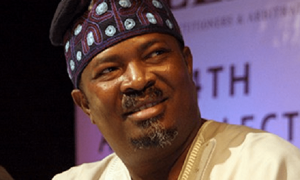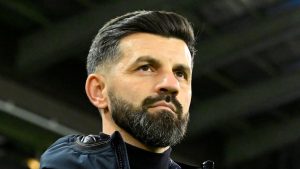Steph Curry leads Warriors to fourth ring, his crowning achievement


By Yaron Weitzman
FOX Sports NBA Writer
BOSTON — Cigar clenched between his teeth, MVP trophy raised toward the sky, title hat perched on top of his head, Steph Curry pranced off the TD Garden floor, masterpiece complete and an NBA champion for the fourth time.
“This one hits different, for sure,” he told reporters a few minutes later from the postgame podium. A champagne-soaked T-shirt clung to his chest, and plastic goggles rested around his chin. “Just knowing what the last three years have meant, what it’s been like from injuries to changing of the guard in the rosters … it’s special.”
He tried explaining why. There was “the three years of baggage we carried coming out of that Game 6 in 2019,” the night the Golden State Warriors, after losing both Klay Thompson and Kevin Durant to serious injuries, fell to the Toronto Raptors in the Finals. He mentioned the Warriors’ ambitious — and, to some, misguided — plan of “parallel timelines of developing young guys and keeping our core together.” He reminded us how just two years ago “we literally had the worst record in the league.”
And yet, here the Warriors were — after a 103-90 series-clinching Game 6 victory — and here Curry was — after leading the Warriors to that victory with 34 points on just 21 shots, to go with seven rebounds and seven assists, the cherry on top of a masterful performance that earned him his first Finals MVP — back on top of the NBA.
“I can say it now,” he said, “I don’t know how many teams could carry that as long as we have with the expectations of comparing us now to teams of past and make it to the mountaintop again.”
It was a strange series, these Finals. Both teams struggled to score. Defense reigned. The Boston Celtics were the bigger team — and often looked like the better one, except for all those moments they spent fumbling the ball around the court, tossing rainbows into the Warriors’ hands and failing to box out.
For all the talk about Curry’s prowess, the Celtics did an admirable job of slowing the Warriors’ attack, even limiting them in half-court possessions to the equivalent of a bottom-five regular-season scoring rate, according to Cleaning the Glass.
On the one hand, the difference came on the other end of the floor, where the Warriors were able to smother the Celtics’ creators, shut down their drive-and-kick blender, force an avalanche of turnovers and then turn those turnovers into points. On the other hand, there was a simpler thing separating these two teams.
The Warriors had Steph Curry, and the Celtics did not.
“He carried us,” Draymond Green said.
Curry’s final Finals numbers — 31.2 points per game, six rebounds per game, five assists per game, 43.8% shooting from deep and 48.2% shooting overall — are remarkable. They also, just as remarkably, don’t do his play and impact justice.
When Curry played, the Warriors thrived. When he sat, they flailed. His mere presence opens all sorts of seams for his teammates, whether he’s dancing with the ball 35 feet from the hoop or scooting around a screen 35 feet away from the ball. That’s why every point the Warriors score when he’s on the court might as well be credited to him.
You’d be hard-pressed to find a dozen players in NBA history with the ability to impact the offensive end of the floor more than Curry. This was on full display throughout these Finals to a level that, despite Curry’s greatness, we’d never seen before because for the once-loaded Warriors, it had never before been required.
But these are not the Warriors of old. The talent level is fine, but the roster is far from stacked. Curry was the team’s lone player to average more than 20 points through the playoffs. These Warriors are one of maybe three NBA champs to not boast a second star in his prime.
“To me,” Warriors head coach Steve Kerr said after the win, “this is his crowning achievement in what’s already been an incredible career.”
Curry didn’t need this championship. His legacy has long been cemented. However, the victory and the securing of his first Finals MVP do make the conversations about his place in NBA history more interesting.
His résumé now features four titles, which is more than Larry Bird and as many as LeBron or Shaq. But it’s when you look at the four together and the role Curry played on each of those teams that you get the full glimpse of his greatness.
There was the 2014-15 squad, on which a new offensive system instituted by then-new head coach Steve Kerr unleashed Curry, transforming him into a mega-star at the heart of a deep, egalitarian, never-ceasing Warriors attack. Think of that as Curry 2.0, a player released from former head coach Mark Jackson’s ground-and-pound attack and finally free to fire away at will from all distances and at a rate never seen before.
That version of Curry was the heart and soul of everything the Warriors did — and the catalyst of their vaunted Death Lineup — but he wasn’t their only weapon. He averaged “just” 23.8 points per game during the 2014-15 season, while Thompson averaged 21.7 and actually led the team in shots per game. Never mind the presence of the still bouncy and rangy Andre Iguodala or the rising Green.
Curry 3.0 was the player who willingly ceded some of his shots and spotlight to Durant and whose equanimity helped keep the ship steady amidst some rough seas. You think a team featuring the personalities of Green and Durant could survive and win two rings if it didn’t have a leader as steady, serene and drama-averse as Curry?
“From a humanity standpoint, from a talent standpoint, humility, confidence — this wonderful combination that just makes everybody want to win for him,” Kerr said.
This year — specifically during this Finals run — we were introduced to Curry 4.0. The Warriors didn’t completely scrap their Beautiful Game offensive attack, but they did lean on Curry to create more than ever before. More pick-and-rolls from the top of the key. More dancing with the ball against Celtics bigs. They did this not because they wanted to — Kerr has made clear over the years that he prefers not to call for pick-and-rolls every time down the floor but rather to see the ball pinged around the court — but because they had to.
This, the Warriors recognized, was their only way to win, and Curry, at the age of 34 and in his 13th NBA season, responded by basically morphing into a better and more efficient version of James Harden.
The fact that Curry could lead the Warriors to titles in each of these roles — the head of the dangerous snake, the benevolent sidekick, the heliocentric star — is what makes him unique, in the literal sense of the word, and why these Warriors will now be remembered as one of the NBA’s few dynasties.
Russell’s Celtics, Magic’s Lakers, Jordan’s Bulls, Kobe’s Lakers, Duncan’s Spurs — and now Curry’s Warriors. That’s the list.
“Without him,” Kerr said, “none of this happens.”
About an hour later, media obligations finally complete and the final bottle of champagne popped, Curry marched his way through the bowels of TD Garden, MVP trophy still in his grip, championship hat still sitting on his head, goggles still around his eyes.
“I’m freezing,” he screamed, his champagne-drenched shirt having dried, a smile stretched across his face. He strode toward the exit. His teammates — and yet another championship celebration — awaited.
Yaron Weitzman is an NBA writer for FOX Sports and the author of Tanking to the Top: The Philadelphia 76ers and the Most Audacious Process in the History of Professional Sports. Follow him on Twitter @YaronWeitzman.
Get more from National Basketball Association Follow your favorites to get information about games, news and more.






